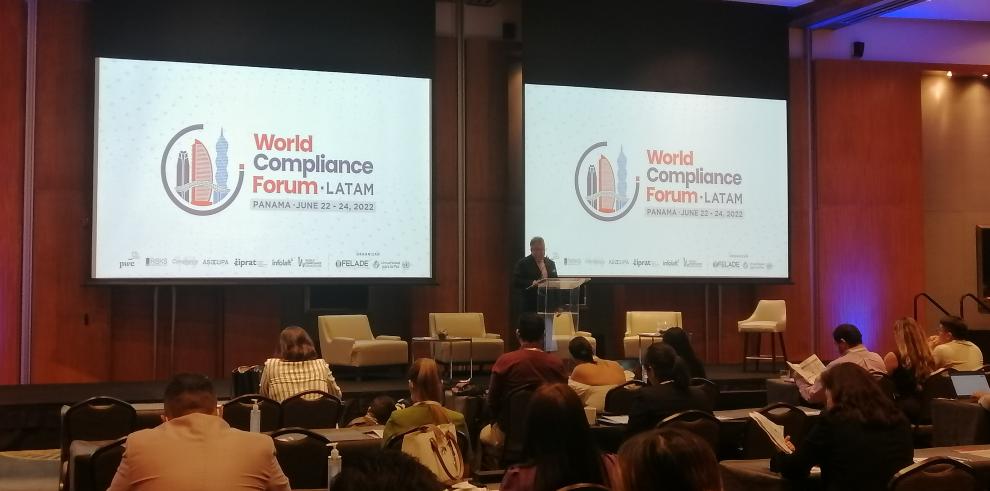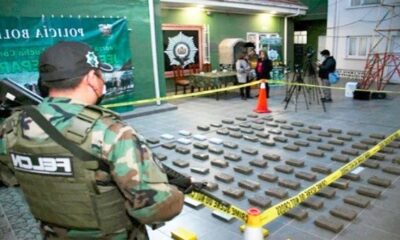Central America
Forum on money laundering and financial crimes to be held in Costa Rica

February 7th |
Costa Rica will host the World Compliance Forum in early March, which will address the most innovative tools against financial crime, organizers announced today.
The event, organized by the Foundation for the Study of Money Laundering (Felade), in alliance with the University for Peace, will be held on March 2 and 3, in person at the Costa Rica Marriott Hotel, but will also have a virtual space.
Felade and the University for Peace announced that 350 compliance officers and specialists from Latin America have already confirmed their attendance, while they added that the broad agenda of conferences and panels will be in charge of more than 20 outstanding specialists from Mexico, Peru, Colombia, Panama, Chile and Costa Rica.
According to the organizers, the Forum, whose theme will be The Age of Digital Compliance, is a unique window on the latest legislative developments and the most innovative tools to protect entities from money laundering, fraud and financial crime.
They also said that participants will address topics such as metaverse, cryptoassets, artificial intelligence for fraud prediction and detection and digital threats and vulnerabilities.
The president of Felade, José Quesada, said that the entry into the digital world has placed us in front of new threats and therefore, he said, it is very important that we begin to visualize the real risks that exist at the level of new digital platforms.
Beyond the clear knowledge we have of crimes on the physical level, we need to better understand where crimes are migrating to in the virtual part and that is why this Forum is focused on current issues such as cryptocurrencies and will analyze successful cases in the financial industry and the prevention of money laundering, Quesada said.
For his part, the rector of the University for Peace, Francisco Rojas, said that organized crime and its activities, such as money laundering, are the greatest threats to democracy in Latin America.
For this reason, the event represents an opportunity to debate these issues with experts and offer new perspectives on the fight against organized crime for professionals and decision makers in the region. The organizers said that among the most relevant conferences of the Forum are The use of artificial intelligence for fraud prediction and detection, Web3 and the metaverse and Cryptocurrencies and their tax treatment.
In addition, they added, there will be panels on illicit financial flows, tax transparency, the outlook for the legality of cryptoassets, and regulatory prospects for 2023.
Central America
Costa Rica Goes to the Polls as Voters Choose Continuity or Change

Costa Ricans head to the polls today to elect the president of the republic and 57 members of the Legislative Assembly for the 2026–2030 term. Voters must choose between continuing the political project of outgoing President Rodrigo Chaves by supporting the ruling right-wing candidate Laura Fernández, or opting for a change in direction proposed by the opposition.
Fernández, representing the Pueblo Soberano Party (PPS), leads opinion polls with close to 40% of voting intention, bolstered by the outgoing president’s approval rating, which exceeds 50%. Chaves is barred from seeking immediate re-election under Costa Rican law.
Trailing far behind is Álvaro Ramos of the National Liberation Party (PLN), with less than 10% support. He is followed by Claudia Dobles of the Citizen Agenda Coalition (CAC), Fabricio Alvarado of New Republic (NR), and Ariel Robles of the Broad Front (FA), each polling between 3% and 5%. Undecided voters, who account for more than 30% of the electorate, could determine the outcome of the presidential race or force a runoff.
In a statement, Costa Rica’s Supreme Electoral Tribunal (TSE) reaffirmed its commitment to transparent and secure elections. “As has been the case for more than 76 years of democratic life in our country, the Supreme Electoral Tribunal guarantees all Costa Ricans that the national elections to be held this Sunday, February 1, will meet the highest standards of security and absolute transparency, allowing us to continue enjoying electoral processes in peace and freedom,” the institution said.
Authorities reported that 53,251 party observers will take part in the electoral process. Of these, 12,472 belong to the Social Christian Unity Party, 11,524 to Pueblo Soberano, 10,451 to the PLN, and 4,141 to the Citizen Agenda Coalition, among others. In addition, six political parties have sworn in 7,520 members of polling station boardsdeployed nationwide.
Central America
U.S. and Guatemala Sign Trade Deal Granting Zero Tariffs to Most Exports

The United States signed a reciprocal trade agreement with Guatemala on Friday, under which 70.4% of Guatemalan exports will enter the U.S. market tariff-free.
Guatemalan President Bernardo Arévalo highlighted the importance of the agreement, stating that it creates a framework of cooperation, certainty, and new opportunities for producers, workers, and entrepreneurs in the country. His remarks were shared in a video published on his official social media channels.
In 2025, 30.3% of Guatemala’s total exports were destined for the United States, amounting to approximately $4.3 billion. As a result, the agreement is expected to directly benefit key sectors of the Guatemalan economy, including agribusiness, manufacturing, and the textile industry.
“Today we have taken another step toward consolidating a country that, when it moves forward united, generates confidence, attracts investment, and creates real development opportunities for all its people,” Arévalo added.
The agreement with Guatemala follows a similar trade deal signed by the United States with El Salvador on Thursday, which includes the elimination of a 10% tariff on Salvadoran imports.
Central America
Panama Supreme Court Strikes Down Panama Ports Concession as Unconstitutional

Panama’s Supreme Court of Justice has ruled unconstitutional the concession contract granted in 1997 to Panama Ports Company (PPC), a subsidiary of the Chinese conglomerate CK Hutchison, which operates two strategic ports along the interoceanic canal. The decision was announced on Thursday, January 29, 2026, following two lawsuits filed by the Comptroller General’s Office.
The ruling directly affects the management of the ports of Balboa, on the Pacific coast, and Cristóbal, on the Atlantic side, both of which have been operated by the company for nearly three decades. According to Panama’s Comptroller General, Anel Flores, an audit uncovered irregularities in the contract that resulted in more than $1.3 billion failing to enter state coffers.
“It is a predatory contract, abusive to the interests of the country,” Flores stated.
The Supreme Court determined that Law 5 of 1997, its subsequent amendments, and the automatic extension granted in 2021 are unconstitutional. The ruling noted that the contract renewal took place without adequate oversight and amid allegations of corruption, despite the Panamanian state holding only a 10% stake in the company.
-

 International4 days ago
International4 days agoU.S. Senate Rejects Budget, Bringing Government Closer to Shutdown Amid DHS Dispute
-

 International5 days ago
International5 days agoFootball Fan Killed in Clashes After Colombian League Match
-

 Central America5 days ago
Central America5 days agoGuatemala President Says Starlink Terminal Found Inside Prison
-

 International5 days ago
International5 days agoRubio Says U.S. Could Participate in Follow-Up Russia-Ukraine Talks
-

 International5 days ago
International5 days agoMissing Spanish Sailor Rescued After 11 Days Adrift in Mediterranean
-

 Central America3 days ago
Central America3 days agoPanama Supreme Court Strikes Down Panama Ports Concession as Unconstitutional
-

 International4 days ago
International4 days agoStorm Kristin Kills Five in Portugal, Leaves Nearly 500,000 Without Power
-

 Central America3 days ago
Central America3 days agoU.S. and Guatemala Sign Trade Deal Granting Zero Tariffs to Most Exports
-

 International4 days ago
International4 days agoMan Arrested After Vehicle Crashes Into Jewish Institution in Brooklyn
-

 International4 days ago
International4 days agoTrump Says Putin Agreed to One-Week Halt in Attacks on Ukraine Amid Extreme Cold
-

 Central America12 hours ago
Central America12 hours agoCosta Rica Goes to the Polls as Voters Choose Continuity or Change






























